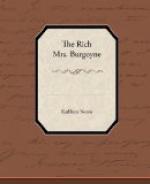So presently callers began to go up to the Hall; first Mrs. Apostleman and Mrs. White, as was fitting, and then a score of other women. Mrs. Apostleman had been the social leader in Santa Paloma when Mrs. White was little Clara Peck, a pretty girl in the High School, whose rich widowed mother dressed her exquisitely, and who was studying French, and could play the violin. But Mrs. Apostleman was an old woman now, and had been playing the game a long time, and she was glad to put the sceptre into younger hands. And she could have put it into none more competent than those of Mrs. Willard White.
Mrs. White was a handsome, clever woman, of perhaps six-or seven-and-thirty. She had been married now for seventeen years, and for all that time, and even before her marriage, she had been the most envied, the most admired, and the most copied woman in the village. Her mother, an insipid, spoiled, ambitious little woman, whose fondest hope was realized when her dashing daughter made a financially brilliant match, had lost no time in warning the bride that the agonies of motherhood, and the long ensuing slavery, were avoidable, and Clara had entirely agreed with her mother’s ideas, and used to laughingly assure the few old friends who touched upon this delicate topic, that she herself “was baby enough for Will!” Robbed in this way of her natural estate, and robbed by the size of her husband’s income from the exhilarating interest of making financial ends meet, Mrs. White, for seventeen years, had led what she honestly considered an enviable and carefree existence. She bought beautiful clothes for herself, and beautiful things for her house, she gave her husband and her mother very handsome gifts. She was a perfect hostess, although it must be admitted that she never extended the hospitalities of her handsome home to anyone who did not amuse her, who was not “worth while”. She ruled her servants well, made a fine president for the local Women’s Club, ran her own motor-car very skillfully, and played an exceptionally good game of bridge. She was an authority upon table-linens, fancy needlework, fashions in dress, new salads, new methods in serving the table.
Willard White, as perfect a type in his own way as she was in hers, was very proud of her, when he thought of her at all, which was really much less often than their acquaintances supposed. He liked his house to be nicely managed, spent his money freely upon it, wanted his friends handsomely entertained, and his wine-cellar stocked with every conceivable variety of liquid refreshment. If Clara wanted more servants, let her have them, if she wanted corkscrews by the gross, why, buy those, too. Only let a man feel that there was a maid around to bring him a glass when he came in from golfing or motoring, and a corkscrew with the glass!




